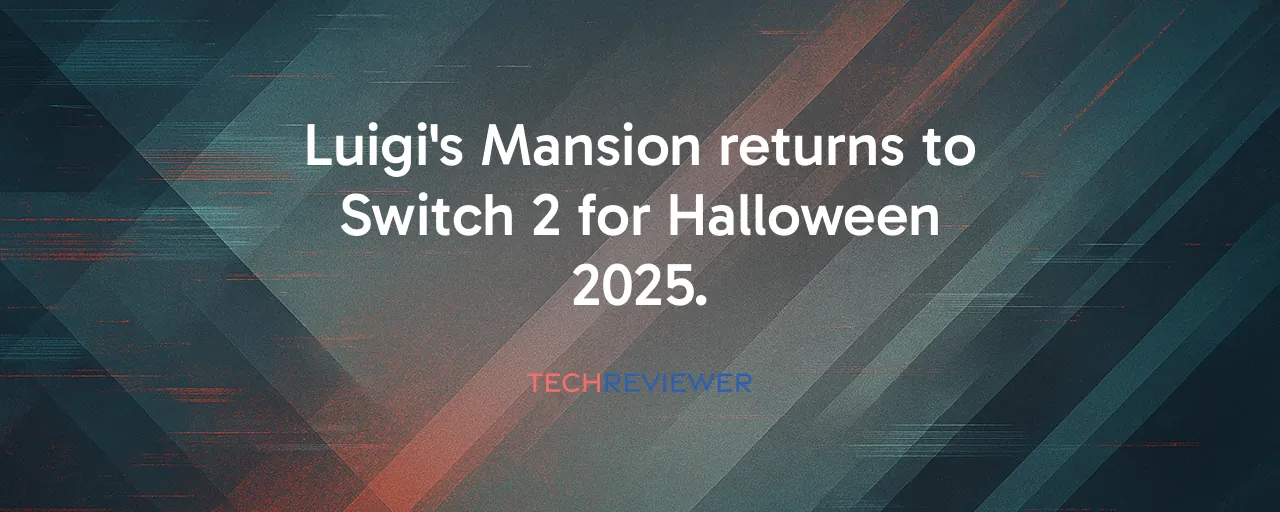A Spooky Classic Returns
Luigi's Mansion, the quirky ghost-hunting adventure from 2001, lands on Nintendo Switch 2 just in time for Halloween on October 30, 2025. Originally a GameCube launch title, it follows Luigi as he vacuums up ghosts with the Poltergust 3000 to save Mario in a haunted mansion. Nintendo's decision to release this fan-favorite through its Switch Online Expansion Pack taps into the spooky season's vibe. With over 3.33 million copies sold back in the day, the game's return feels like a nostalgic gift for longtime fans and a fresh discovery for new players. Its darker tone and challenging gameplay still hold up, proving some classics age gracefully.
This release completes the Luigi's Mansion trilogy on Switch 2, joining the 2019 hit Luigi's Mansion 3, with 12.82 million sales, and the 2024 remaster of Luigi's Mansion 2 HD. Nintendo's timing is no accident, aligning the ghost-filled adventure with Halloween to hook players craving seasonal thrills. Beyond the festive marketing, this move highlights a bigger trend: bringing retro games back through subscription services. It's a chance to relive a piece of gaming history without dusting off an old GameCube or scouring pricey collector's markets.
Emulation Done Right, Mostly
Nintendo's emulation tech for Switch 2 makes Luigi's Mansion shine on modern screens. The game runs at higher resolutions than its original 480p, delivering crisp visuals while keeping the classic 4:3 aspect ratio for purists. Features like save states and the option to choose between NTSC and PAL versions add modern polish. Testing from outlets like Digital Foundry shows some titles, like F-Zero GX, hit a smoother 60fps compared to the original hardware's occasional dips. A new GameCube-style controller for Switch 2 sweetens the deal, letting players recapture that retro feel.
But it's not flawless. Players have noticed extra input lag, sometimes one to two frames, which can throw off precision in fast-paced moments. Analog stick sensitivity doesn't quite match the original GameCube controllers, and occasional frame stutters pop up, unlike the rock-solid originals. These hiccups don't ruin the experience for casual players, but hardcore fans, especially those who played in 2001, might feel the difference. Nintendo's still tweaking the emulation, and updates could smooth out these quirks, making the revival even more compelling.
Nintendo vs. Microsoft: Retro Strategies Compared
Nintendo's approach with Switch Online, now boasting over 34 million subscribers as of September 2024, leans heavily on its own classic games. By adding Luigi's Mansion to the Expansion Pack, priced at $49.99 a year, Nintendo banks on nostalgia to keep subscribers hooked. Unlike competitors, it focuses on first-party gems like The Legend of Zelda: The Wind Waker and Super Mario Strikers, with only six GameCube titles so far. This curated, exclusive library sets it apart from Microsoft's Xbox Game Pass, which blends retro titles with new releases across a broader third-party catalog. Game Pass, at up to $29.99 a month for its top tier, offers more variety but less focus on preserving a single company's legacy.
The contrast reveals different priorities. Nintendo creates a walled garden, tying GameCube games to Switch 2 hardware and the Expansion Pack, which can frustrate fans who want broader access. Microsoft's model feels more open but dilutes the nostalgic punch of curated classics. Both face criticism, with Nintendo criticized for its slow rollout and technical hiccups, and Microsoft for overwhelming users with choice. Nintendo's Halloween-timed release shows a knack for cultural moments, while Game Pass's retro offerings often get buried under new titles. The lesson is that focused nostalgia can hit harder but risks alienating players who crave flexibility.
The Catch With Subscription Gaming
Subscription services like Switch Online make classics like Luigi's Mansion accessible without hunting down pricey GameCube discs or consoles, now collector's items. For $49.99 a year, or as low as about $10 per person with the $79.99 family plan, players can dive into a growing library. It's a low barrier for casual gamers or younger players meeting Luigi for the first time. But there's a trade-off: you don't own the games. If your subscription lapses or Nintendo pulls the plug, access vanishes. This worries preservationists, especially since 87% of pre-2010 games are out of print, per the Video Game History Foundation.
Fans also grumble about paying again for games they bought on older platforms like the Wii's Virtual Console. The Switch 2 exclusivity adds another hurdle, locking out the 150.86 million original Switch owners as of December 2024. Meanwhile, free PC emulation, though legally murky, offers an alternative that doesn't require a subscription or new hardware. Nintendo counters with convenience and legality, but the model raises questions about long-term access. Will these games stay available in a decade, or will they vanish if the service shuts down?
Why Nostalgia Matters
Luigi's Mansion's return connects players across generations. Older players, who first tackled the GameCube in 2001, relive childhood memories of Luigi's eerie adventure. Younger gamers, drawn in by Luigi's Mansion 3's 12.82 million sales, get to explore the franchise's roots. Nintendo's clever Halloween release taps into this emotional pull, turning a 24-year-old game into a cultural event. Online forums buzz with players sharing stories of late-night ghost hunts, showing how games can spark shared joy across decades.
Still, nostalgia alone doesn't solve everything. Some argue the $49.99 Expansion Pack price feels steep for a small library, and technical flaws like input lag dampen the magic for purists. Preservationists worry that subscription models prioritize profit over ensuring games endure for future generations. Yet the excitement around Luigi's Mansion proves that well-timed, well-executed revivals can unite players, blending old-school charm with modern accessibility. Nintendo's bet on nostalgia keeps paying off, but it walks a fine line between celebration and commercialization.
